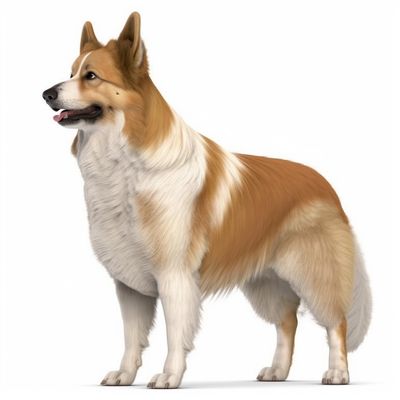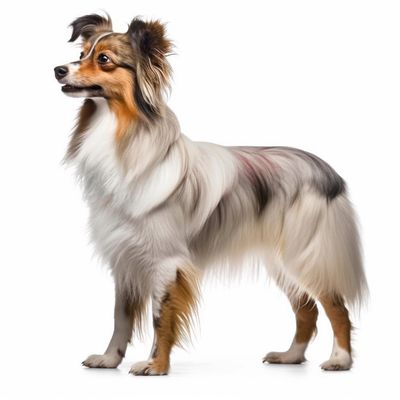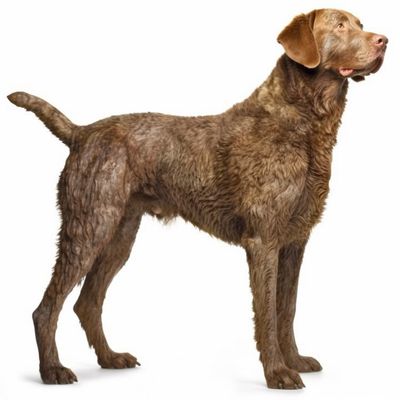Pembroke Welsh Corgi - vs - Papillon - vs - Chesapeake Bay Retriever

Pembroke Welsh Corgis are small dogs with a sturdy build, standing 10-12 inches tall and weighing 24-30 lbs.
Pembroke Welsh Corgis have moderate energy levels and enjoy daily walks, playtime, and interactive toys to stay engaged.
Pembroke Welsh Corgis require regular exercise, such as walks and playtime, to keep them mentally and physically fit.
Pembroke Welsh Corgis are intelligent and eager to please, making them easy to train with consistency and positive reinforcement.
Pembroke Welsh Corgis are highly intelligent dogs, known for their problem-solving skills and quick learning abilities.
Pembroke Welsh Corgis are highly adaptable and can thrive in various living situations, including apartments and homes with yards.
Pembroke Welsh Corgis are generally good with children, but their herding instincts may lead them to nip at heels, so supervision is recommended.
Pembroke Welsh Corgis usually get along well with other dogs and pets, especially if socialized from an early age.
Pembroke Welsh Corgis can handle cold climates, thanks to their double coat, but still require proper shelter and protection during extreme weather.
Pembroke Welsh Corgis can manage in hot climates but require shade, water, and limited exercise during the hottest parts of the day.
Pembroke Welsh Corgis have a double coat that sheds seasonally. Regular grooming can help keep shedding under control.
Pembroke Welsh Corgis require regular grooming, including brushing and bathing, to keep their coats clean and healthy.
Pembroke Welsh Corgis have average bark tendencies and may bark for various reasons, such as alerting their owners or during playtime.
Pembroke Welsh Corgis are generally healthy, but regular veterinary checkups and preventative care are still necessary.

Papillons have a high energy level and enjoy being active, participating in playtime, and exploring their environment.
Papillons need regular exercise, including daily walks and playtime, to maintain their physical and mental well-being.
Papillons are highly trainable dogs, eager to learn and excel in various activities such as obedience, agility, and tracking.
Papillons are highly intelligent dogs, known for their problem-solving abilities and quick learning.
Papillons can adapt well to various living situations, including apartments and larger homes, as long as their exercise needs are met.
Papillons can be good with children, but their small size makes them more susceptible to injury. Supervision and proper handling are important.
Papillons can get along well with other pets, especially when raised together. However, their small size may require caution around larger animals.
Papillons can tolerate colder temperatures, but their small size and thin coat require proper protection during extreme cold.
Papillons can tolerate hot climates but need to be monitored for signs of overheating during exercise.
Papillons have a long, silky coat that sheds moderately and requires regular brushing to prevent tangles and mats.
Papillons require regular grooming, including brushing and occasional bathing, to keep their coats clean and healthy.
Papillons have average bark tendencies and may bark for various reasons, such as alerting their owners or during playtime.
Papillons are generally healthy, but regular veterinary checkups and preventative care are still necessary.

Chesapeake Bay Retrievers are large dogs, weighing 55-80 lbs, with a height of 21-26 inches.
Chesapeake Bay Retrievers have a high energy level and require regular exercise and mental stimulation.
Chesapeake Bay Retrievers need a significant amount of exercise, including daily walks, runs, and opportunities to swim or retrieve.
Chesapeake Bay Retrievers are intelligent and trainable, but can be stubborn. Consistent, positive reinforcement is essential.
Chesapeake Bay Retrievers are highly intelligent dogs and excel in various dog sports and activities, especially those involving water.
Chesapeake Bay Retrievers can adapt to different living situations, but they need plenty of space and exercise to thrive.
Chesapeake Bay Retrievers are good with children when properly socialized and supervised.
Chesapeake Bay Retrievers can get along well with other pets, especially when raised together.
Chesapeake Bay Retrievers are well-suited for cold climates, thanks to their dense, water-resistant coats.
Chesapeake Bay Retrievers can tolerate hot climates but need to be monitored for signs of overheating during exercise.
Chesapeake Bay Retrievers have a dense coat that sheds moderately, requiring regular brushing to minimize shedding.
Chesapeake Bay Retrievers require regular grooming, including brushing and occasional bathing to keep their coats clean and healthy.
Chesapeake Bay Retrievers bark occasionally, usually only when necessary or provoked.
Chesapeake Bay Retrievers are generally healthy, but regular veterinary checkups and preventative care are still necessary.



